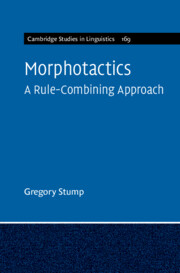Book contents
- Morphotactics
- Cambridge Studies in Linguistics
- Morphotactics
- Copyright page
- Dedication
- Contents
- Figures
- Tables
- Preface and Acknowledgments
- Abbreviations
- Symbols and Operators
- 1 Canonical Morphotactics
- 2 Rule Combinations
- 3 Dependent Rules and Carrier Rules
- 4 Rule Composition and Rule Ordering
- 5 Extending Canonical Morphotactic Criteria to Composite Rules
- 6 Rule Combinations Expressing Holistic Content
- 7 Rule Aggregation
- 8 Complex Morphotactic Interactions in Swahili
- 9 The Nonassociativity of Rule Composition in Murrinhpatha
- 10 Potentiation and Counterpotentiation
- 11 Rule Combinations and Morphological Simplicity
- 12 Rule‑combining Morphotactics and Morphological Theories
- 13 Conclusions
- References
- Index
8 - Complex Morphotactic Interactions in Swahili
Published online by Cambridge University Press: 24 November 2022
- Morphotactics
- Cambridge Studies in Linguistics
- Morphotactics
- Copyright page
- Dedication
- Contents
- Figures
- Tables
- Preface and Acknowledgments
- Abbreviations
- Symbols and Operators
- 1 Canonical Morphotactics
- 2 Rule Combinations
- 3 Dependent Rules and Carrier Rules
- 4 Rule Composition and Rule Ordering
- 5 Extending Canonical Morphotactic Criteria to Composite Rules
- 6 Rule Combinations Expressing Holistic Content
- 7 Rule Aggregation
- 8 Complex Morphotactic Interactions in Swahili
- 9 The Nonassociativity of Rule Composition in Murrinhpatha
- 10 Potentiation and Counterpotentiation
- 11 Rule Combinations and Morphological Simplicity
- 12 Rule‑combining Morphotactics and Morphological Theories
- 13 Conclusions
- References
- Index
Summary
Within a system, multiple patterns of rule combination may interact in complex ways. I present a detailed analysis of Swahili verb inflection in which simple rules, composite rules and aggregated rules all enter into intricate competition, yielding an extravaganza of deviations from canonical morphotactic criteria. At the center of this discussion are three characteristics of Swahili conjugation: (i) the polyfunctionality of verbal concords (in virtue of which the same rule is used to express the noun class of a verb’s subject, that of its pronominal object, or that of a relativized argument), (ii) the expression of negation (by means of three complementary rules), and (iii) the marking of relative verb forms (whose relativized-argument affix participates in an extensive pattern of affix counterposition). The rule-combining approach to morphotactics allows the interacting details of these subsystems to be resolved into two very general types exhibiting an unexpected degree of economy.
Keywords
- Type
- Chapter
- Information
- MorphotacticsA Rule-Combining Approach, pp. 224 - 258Publisher: Cambridge University PressPrint publication year: 2022

